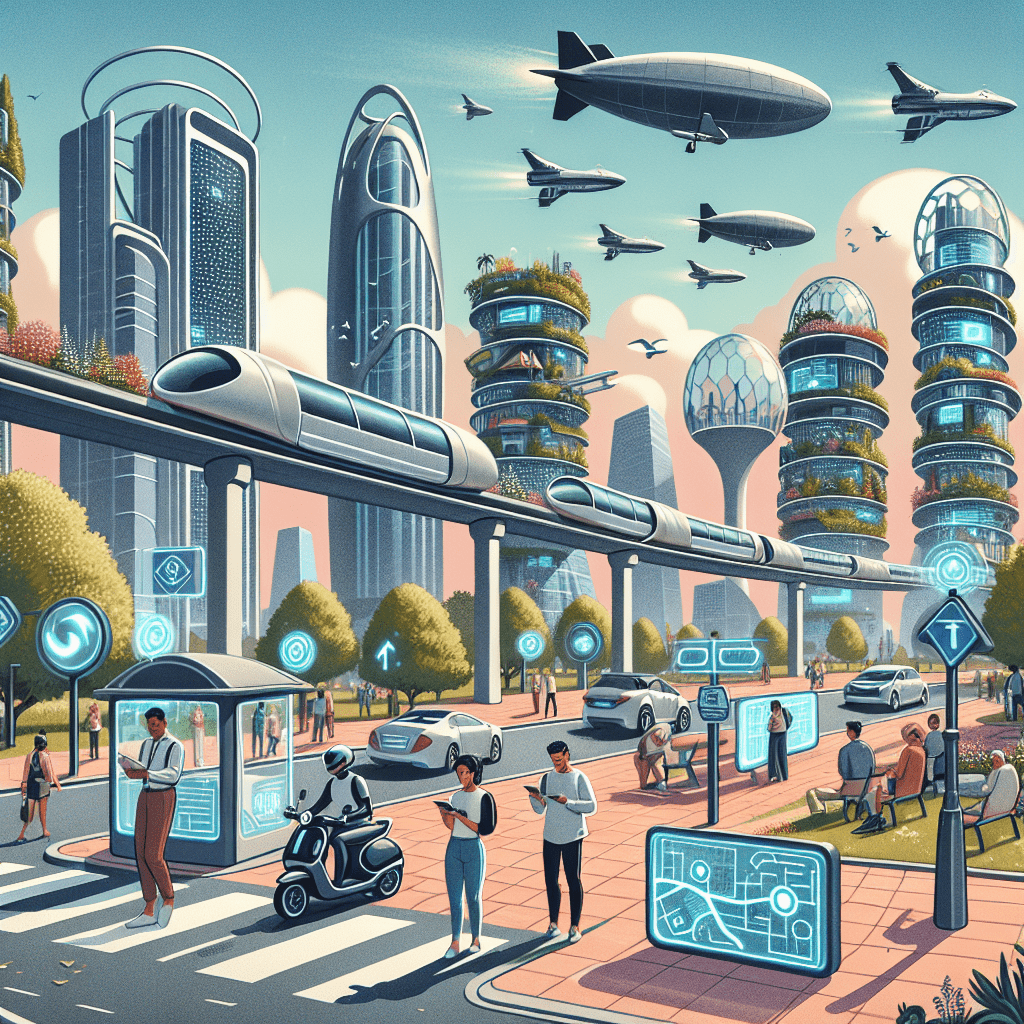Sustainable Travel: Must-Visit Green Cities in 2025

As the world embraces future travel trends, sustainability has become a central focus for travelers and the travel industry alike. By 2025, the demand for eco-friendly travel options is expected to surge, driven by a growing awareness of environmental impact and a desire to support responsible tourism. Green cities are emerging as pioneers in sustainable travel, setting new standards through innovative policies, renewable energy initiatives, and community-driven conservation efforts. These urban centers not only reduce their carbon footprint but also offer enriching experiences that align with the values of conscious travelers.
Travelers seeking vacation planning 2025 with an emphasis on sustainability will find that green cities provide a unique blend of modern amenities and environmental stewardship. From efficient public transportation systems to eco-friendly accommodations and local organic cuisine, these destinations are redefining what it means to travel responsibly. Choosing sustainable destinations in 2025 means contributing to the preservation of natural resources while enjoying vibrant cultural experiences and cutting-edge travel technology advancements.
For those interested in exploring the possibilities of travel 2025, understanding the role of sustainable travel and the rise of green cities is essential. These destinations are not only shaping the future of tourism but also inspiring travelers to make choices that benefit both the planet and local communities. As sustainable travel 2025 continues to evolve, green cities will remain at the forefront, offering a blueprint for how tourism can thrive in harmony with the environment.

Highlighting Top Green Cities Championing Sustainable Travel
Copenhagen, Denmark
Copenhagen stands out as a global leader in sustainable travel 2025, thanks to its comprehensive approach to eco-friendly urban living. The city’s innovative public transportation system is designed to minimize carbon emissions while maximizing convenience for residents and visitors alike. With an extensive network of electric buses and trains, Copenhagen ensures that travel within the city is both efficient and environmentally responsible. However, what truly sets Copenhagen apart is its bike-friendly infrastructure. Over 60% of the population commutes by bicycle daily, supported by over 390 kilometers of dedicated bike lanes. This commitment to cycling not only reduces traffic congestion but also significantly lowers the city’s carbon footprint, making it a model for future travel trends worldwide.
Urban planning in Copenhagen is deeply rooted in sustainability principles. The city prioritizes renewable energy sources, with wind power playing a major role in its energy mix. Copenhagen aims to become the world’s first carbon-neutral capital by 2025, a goal supported by widespread investments in solar energy, district heating systems, and energy-efficient buildings. Waste reduction is another critical focus, with comprehensive recycling programs and initiatives to minimize landfill use. These efforts create a clean, green environment that appeals to travelers seeking eco-friendly travel options. Copenhagen’s success demonstrates how smart travel solutions and sustainable urban design can coexist, offering a blueprint for other cities aiming to lead the travel industry 2025 toward a greener future.
Vancouver, Canada
Vancouver is widely recognized for its strong commitment to sustainability, making it a must-visit destination for those interested in sustainable travel 2025. The city has set ambitious zero-emission goals, aiming to reduce greenhouse gas emissions by 80% below 2007 levels by 2050. This commitment is reflected in Vancouver’s green building initiatives, which promote energy-efficient construction and the use of sustainable materials. Many new developments in the city adhere to LEED (Leadership in Energy and Environmental Design) standards, ensuring that buildings minimize environmental impact while providing healthy living spaces. These efforts contribute to Vancouver’s reputation as one of the world’s most livable and eco-conscious cities.
Beyond its built environment, Vancouver boasts an abundance of natural parks and green spaces that enhance the travel experience trends for eco-conscious visitors. Stanley Park, one of the largest urban parks in North America, offers miles of walking and biking trails surrounded by lush forests and waterfront views. The city also encourages local, eco-conscious activities such as farmers’ markets, sustainable seafood dining, and wildlife conservation tours. These options allow travelers to engage with the environment responsibly while supporting local communities. Vancouver’s integration of nature and urban life exemplifies how travel destinations 2025 can balance growth with environmental stewardship, making it a prime example of sustainable travel in action.
Singapore
Singapore has rapidly transformed into a green city that exemplifies sustainable travel 2025 through innovative urban planning and environmental policies. One of the city’s most striking features is the integration of lush greenery into its urban spaces. Vertical gardens, rooftop parks, and extensive tree-lined streets create a vibrant, natural atmosphere within the dense cityscape. This approach not only improves air quality but also enhances the well-being of residents and visitors. Singapore’s commitment to green spaces is evident in projects like Gardens by the Bay, a futuristic park that combines nature with cutting-edge technology to promote biodiversity and environmental education.
Water conservation is another area where Singapore leads the way. The city-state has implemented pioneering policies to manage its limited water resources sustainably, including rainwater harvesting, wastewater recycling, and desalination. These initiatives ensure a reliable water supply while minimizing environmental impact. Sustainable urban development is further supported by strict regulations on energy efficiency and waste management, encouraging businesses and residents to adopt eco-friendly practices. Singapore’s holistic approach to sustainability demonstrates how travel technology advancements and smart travel solutions can be leveraged to create a thriving, green metropolis. For travelers interested in international travel 2025, Singapore offers a compelling example of how urban innovation and environmental responsibility can coexist seamlessly.

Unique Sustainable Travel Experiences Offered by These Cities
Eco-Lodging Options Emphasizing Minimal Environmental Impact
As sustainable travel 2025 becomes a priority for many, eco-lodging options in leading green cities are evolving to meet the demand for accommodations that minimize environmental impact. Hotels and hostels certified for green practices are increasingly common, offering travelers a chance to stay in places that prioritize energy efficiency, water conservation, and waste reduction. These establishments often incorporate renewable energy sources such as solar panels, use eco-friendly building materials, and implement rigorous recycling programs. Certifications like LEED and Green Key provide assurance that these accommodations meet high sustainability standards, making them attractive choices for vacation planning 2025.
Beyond traditional hotels, community-based accommodations are gaining popularity as a way to support local economies while providing authentic travel experiences. These lodgings often involve partnerships with local residents or cooperatives, ensuring that tourism revenue benefits the community directly. Staying in such accommodations allows travelers to engage more deeply with the culture and environment of the destination, fostering a sense of responsibility and connection. This approach aligns with future travel trends that emphasize meaningful, low-impact travel experiences. By choosing eco-lodging options, visitors contribute to the preservation of natural resources and help promote sustainable development within these green cities.
Responsible Dining and Food Sourcing
Responsible dining is a cornerstone of sustainable travel 2025, and green cities are leading the way with farm-to-table restaurants that prioritize organic and locally sourced ingredients. These establishments reduce the carbon footprint associated with food transportation and support regional farmers and producers. Menus often highlight seasonal produce, sustainable seafood, and ethically raised meats, reflecting a commitment to environmental stewardship and health-conscious dining. This trend not only enhances the travel experience but also encourages visitors to consider the broader impact of their food choices.
Efforts to reduce food waste are also integral to the sustainable dining movement in these cities. Many restaurants implement strategies such as composting, donating surplus food to local charities, and using technology to optimize inventory management. Sustainable fisheries are supported through partnerships that ensure responsible harvesting practices, protecting marine ecosystems and promoting biodiversity. These initiatives align with travel safety guidelines and travel regulations 2025 that increasingly emphasize environmental responsibility. For travelers seeking eco-friendly travel options, dining in these cities offers a chance to enjoy delicious meals while contributing to a more sustainable food system.
Green Activities and Tours
Green activities and tours are essential components of the sustainable travel experience trends shaping travel destinations 2025. Many cities offer electric or bike tours that spotlight cultural heritage and environmental awareness, providing an immersive way to explore urban landscapes without contributing to pollution. These tours often include knowledgeable guides who educate visitors about local history, ecology, and sustainability efforts, enriching the overall travel experience. By choosing such tours, travelers participate in smart travel solutions that reduce environmental impact while supporting local businesses.
Wildlife conservation efforts and educational eco-tours are also prominent in these green cities. Visitors can engage with projects focused on protecting endangered species, restoring natural habitats, and promoting biodiversity. These tours often involve hands-on activities or observation opportunities that foster a deeper understanding of conservation challenges and successes. Such experiences align with post-pandemic travel 2025 priorities, where travelers seek meaningful, responsible interactions with nature. By participating in green activities and tours, visitors contribute to ongoing conservation efforts and gain a greater appreciation for the delicate balance between tourism and environmental preservation.

Practical Tips for Travelers Embracing Sustainable Travel in 2025
Planning Low-Impact Transportation Within and Between Cities
One of the most effective ways to embrace sustainable travel 2025 is by carefully planning transportation choices that minimize environmental impact. Utilizing public transit systems is a cornerstone of low-impact travel within cities. Many green cities have invested heavily in efficient, clean public transportation options such as electric buses, trams, and subways, which reduce reliance on private vehicles and lower carbon emissions. Additionally, car-sharing programs offer flexible alternatives for travelers who need occasional vehicle access without the environmental burden of ownership. These smart travel solutions not only reduce pollution but also help alleviate urban congestion, enhancing the overall travel experience.
Biking infrastructure is another critical component of sustainable urban mobility. Cities like Copenhagen and Vancouver have extensive bike lanes and rental programs that encourage visitors to explore on two wheels. Biking is not only eco-friendly but also offers a more intimate way to experience local culture and scenery. When planning intercity or international travel 2025, choosing airlines and routes that participate in carbon offset programs can further reduce your travel footprint. Many airlines now offer options to invest in environmental projects that compensate for the emissions generated by flights, aligning with future travel trends focused on sustainability. Thoughtful transportation planning is essential for travelers committed to eco-friendly travel options and responsible tourism.
Packing and Behavior Choices That Reduce Environmental Footprint
Reducing environmental impact begins long before arrival at a destination. Thoughtful packing and mindful behavior are key elements of sustainable travel 2025. Bringing reusable items such as water bottles, shopping bags, and utensils helps minimize single-use plastics, which are a major contributor to pollution worldwide. Travelers are encouraged to choose lightweight, durable products that can be used repeatedly throughout their journey. This approach not only reduces waste but also aligns with travel safety guidelines that increasingly emphasize environmental responsibility.
Respecting local cultures and natural habitats is equally important. Sustainable travelers understand the value of preserving the integrity of the places they visit by following established trails, avoiding disturbance to wildlife, and adhering to local customs and regulations. This respectful behavior supports conservation efforts and fosters positive relationships between visitors and host communities. Incorporating these practices into vacation planning 2025 ensures that travel experiences remain enriching and sustainable for future generations. By adopting eco-conscious habits, travelers contribute to the broader goals of the travel industry 2025, which increasingly prioritizes environmental stewardship and cultural sensitivity.
Supporting Local Communities and Businesses
Supporting local communities and businesses is a vital aspect of sustainable travel 2025 that benefits both travelers and destinations. Purchasing artisan products directly from local makers helps preserve traditional crafts and provides economic opportunities that empower communities. These authentic souvenirs often carry cultural significance and tell the story of the region, enriching the travel experience trends sought by modern travelers. Dining at locally owned establishments further supports the local economy while offering fresh, regionally sourced cuisine that aligns with responsible dining practices.
Engaging with community-led conservation and sustainability initiatives offers travelers a meaningful way to contribute beyond their visit. Many green cities provide opportunities to participate in volunteer programs, educational workshops, or eco-tourism projects that promote environmental awareness and social responsibility. These experiences deepen the connection between visitors and the places they explore, fostering a sense of stewardship and shared purpose. Incorporating these practices into travel booking innovations and vacation planning 2025 ensures that tourism supports long-term sustainability goals. By prioritizing local engagement, travelers help create resilient communities and vibrant destinations that thrive in the evolving travel industry 2025 landscape.

Green Cities: The Future of Sustainable Travel in 2025
Green cities are setting the standard for the future of sustainable travel, offering travelers a unique combination of environmental responsibility and enriching experiences. As the travel industry 2025 continues to evolve, these urban centers demonstrate how innovation, thoughtful urban planning, and community engagement can create destinations that prioritize both ecological health and visitor satisfaction. From advanced public transportation systems and renewable energy initiatives to eco-friendly accommodations and green activities, these cities provide a comprehensive model for sustainable tourism. Travelers who choose to explore these destinations benefit from immersive cultural experiences that are designed to minimize environmental impact while supporting local economies and conservation efforts. This shift toward sustainable travel 2025 reflects broader future travel trends that emphasize the importance of preserving natural resources and fostering meaningful connections between people and places.
Making mindful travel choices is essential for ensuring that tourism continues to have a positive influence on the planet and the communities it touches. By opting for eco-friendly travel options, supporting local businesses, and respecting travel safety guidelines, travelers contribute to the long-term health and vibrancy of the destinations they visit. These responsible behaviors encourage a lasting positive impact, helping to protect natural habitats, reduce carbon footprints, and promote cultural preservation. As vacation planning 2025 increasingly incorporates sustainability principles, travelers are empowered to make decisions that align with their values and the needs of the environment. Ultimately, embracing sustainable travel not only benefits the planet but also enriches the traveler’s experience, creating a cycle of responsible tourism that supports a healthier, more resilient world for generations to come.